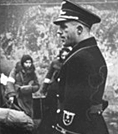 |

|
Transcript
"Auschwitz
was very frightening in a certain extent, because
it was full of Germans. Because until then we
didn't see a lot of Germans in the ghetto, only
occasionally. It was full of Germans and the Germans
with dogs, and there were these barbed wires,
with electricity in it you know. Discipline, very
strict discipline. This feeling of death, all
these people going in the gas chamber. It was
a very weird place, very weird place. With this
atmosphere of death all the time you know, and
this unbelievable situation of people being…
you could smell, you could smell these people
being burnt. All the time you smelt this…
it was a little bit like you know, when people
used to boil glue, it was the bones that smelt
like glue. You had volunteers who would go with
the Germans you know, and get a bit of food, and
they were what was called the kapo, and the block
leader you know. Because every of these huts,
it was a block, which was called a block, had
a block leader who had a little cubicle all to
herself, with the women a woman and with the men
a man. Because there were only women in our block,
we were separated then from the men, so the men
had men and the women had women. And it was like
a glass cubicle, so they could see us. And you
could recognise them because they were not starved,
you know, they looked normal in their faces, in
their bodies, they weren't hungry, they had enough
to eat, and they had reasonable clothes on, they
had good clothes on. So, you knew who they were,
and they were very sadistic and very cruel, and
they treated us, the other prisoners, very very
badly. They were prisoners like us, but they had
privileged positions you see."
|
 |
 |
 |